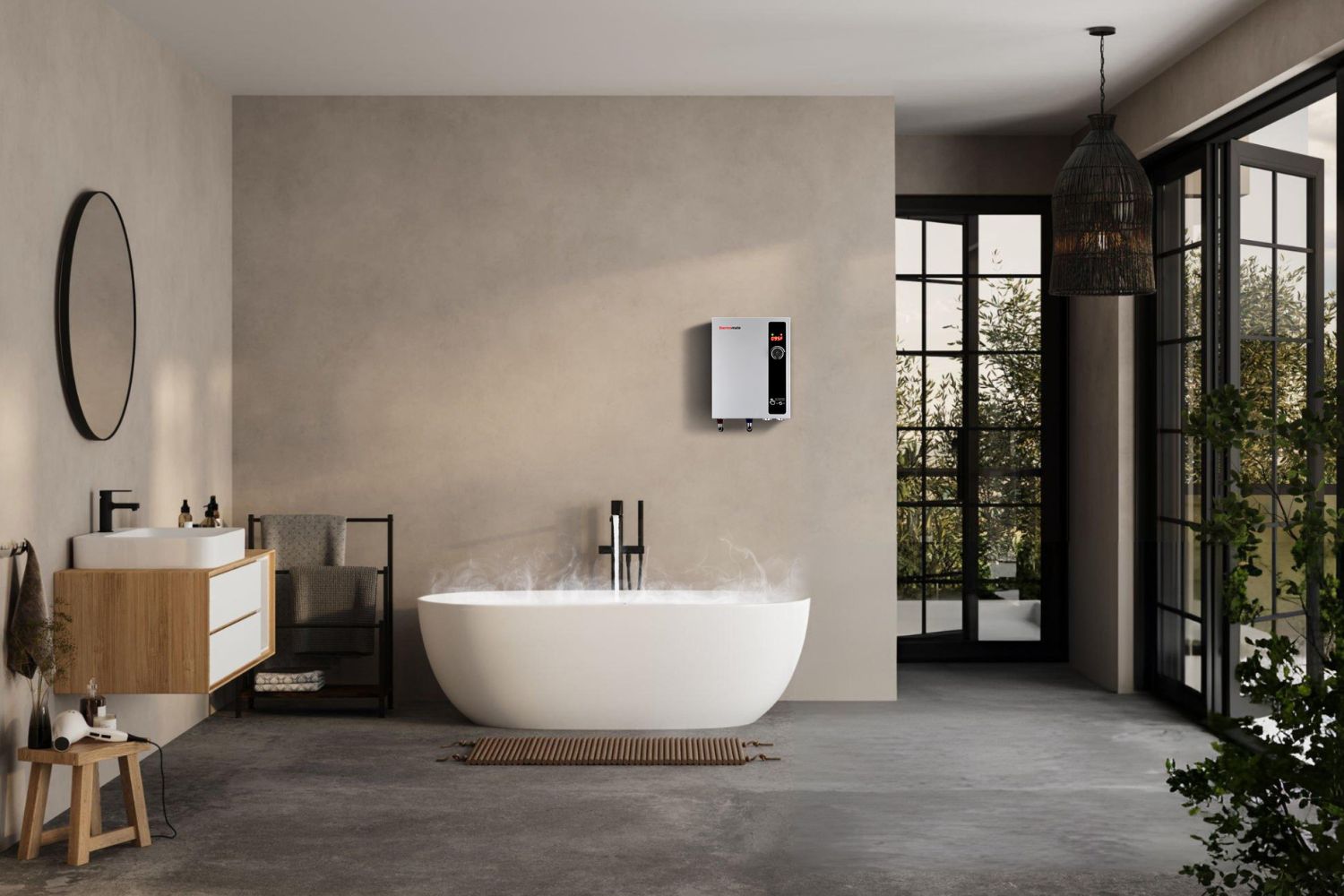In der sich ständig weiterentwickelnden Welt der Haushaltsgeräte haben sich elektrische Durchlauferhitzer als bahnbrechende Neuerung erwiesen und bieten beispiellose Effizienz und Komfort. Im Gegensatz zu herkömmlichen Warmwasserbereitern, die große Wassermengen speichern und ständig erhitzen, liefern elektrische Durchlauferhitzer Warmwasser auf Abruf, was zu erheblichen Energieeinsparungen und einer endlosen Warmwasserversorgung führt. Doch was genau macht diese Technologie so revolutionär? Lassen Sie uns die Funktionsweise und die Vorteile elektrischer Durchlauferhitzer näher betrachten.
So funktionieren elektrische Durchlauferhitzer
Das Herzstück elektrischer Durchlauferhitzer ist ein kompakter und dennoch leistungsstarker Wärmetauscher. Beim Öffnen des Warmwasserhahns fließt kaltes Wasser durch das Gerät und wird von einem elektrischen Heizelement erhitzt. Dieser Vorgang erfolgt nahezu augenblicklich und sorgt dafür, dass innerhalb von Sekunden heißes Wasser bereitgestellt wird. Hier ein genauerer Blick auf die wichtigsten Komponenten:
-
Elektrische Heizelemente : Diese Elemente erhitzen das Wasser beim Durchlaufen des Geräts. Sie bestehen in der Regel aus hochwertigem Kupfer oder Edelstahl und sind auf schnelles Erhitzen und lange Lebensdauer ausgelegt.

-
Durchflusssensor : Dieser Sensor erkennt, wenn ein Warmwasserhahn geöffnet wird, und signalisiert der Steuerplatine, die Heizelemente zu aktivieren. Dadurch wird sichergestellt, dass die Heizung nur dann in Betrieb ist, wenn Warmwasser benötigt wird, was die Energieeffizienz erhöht.
-
Steuerplatine : Die Steuerplatine fungiert als Gehirn des Geräts und steuert den gesamten Heizprozess. Sie überwacht Durchflussmenge und Temperatur und passt die Energieabgabe an, um eine konstante Wassertemperatur zu gewährleisten.
-
Wärmetauscher : Der Wärmetauscher überträgt die Wärme der elektrischen Heizelemente auf das durch das Gerät fließende Wasser. Moderne Modelle verwenden effiziente Materialien, um die Wärmeübertragung zu maximieren und den Energieverlust zu minimieren.
Die Vorteile der elektrischen Durchlauferhitzer-Technologie
-
Energieeffizienz : Herkömmliche Warmwasserbereiter erhitzen das Wasser kontinuierlich, um eine bestimmte Temperatur zu halten, was zu Energieverlusten im Bereitschaftsbetrieb führt. Elektrische Durchlauferhitzer hingegen erhitzen Wasser nur bei Bedarf und reduzieren den Energieverbrauch im Vergleich zu herkömmlichen Warmwasserspeichern um 24–34 %.
-
Endlos heißes Wasser : Mit der elektrischen Durchlauferhitzer-Technologie geht Ihnen das heiße Wasser nie aus. Solange Bedarf besteht, liefert das Gerät kontinuierlich heißes Wasser und ist somit ideal für Haushalte mit hohem Warmwasserverbrauch.
-
Platzsparend : Elektrische Durchlauferhitzer sind deutlich kleiner als ihre herkömmlichen Gegenstücke. Sie können an der Wand oder in kompakten Räumen installiert werden und sparen so wertvolle Bodenfläche.
-
Längere Lebensdauer : Die durchschnittliche Lebensdauer eines elektrischen Durchlauferhitzers beträgt etwa 20 Jahre, verglichen mit 10–15 Jahren bei herkömmlichen Modellen mit Speicher. Diese Langlebigkeit, kombiniert mit niedrigeren Betriebskosten, macht elektrische Durchlauferhitzer zu einer sinnvollen Langzeitinvestition.
-
Umweltfreundlich : Elektrische Durchlauferhitzer verbrauchen weniger Energie und tragen so zu geringeren Treibhausgasemissionen bei. Das macht sie zu einer umweltfreundlichen Wahl für umweltbewusste Hausbesitzer.
-
Geringerer Wartungsaufwand : Elektrische Durchlauferhitzer erfordern im Vergleich zu Gasmodellen weniger Wartung. Eine Entlüftung ist nicht erforderlich, und das Risiko von Gaslecks oder Verbrennungsproblemen wird eliminiert.
Innovationen in der elektrischen Durchlauferhitzer-Technologie
Die neuesten Fortschritte in der Technologie elektrischer Durchlauferhitzer haben deren Leistung und Benutzerfreundlichkeit weiter verbessert:
- Intelligente Steuerung : Moderne elektrische Durchlauferhitzer verfügen über intelligente Steuerungen und WLAN-Konnektivität, sodass Hausbesitzer die Einstellungen per Fernzugriff über Smartphone-Apps überwachen und anpassen können.
- Erweiterte Sicherheitsfunktionen : Verbesserte Sicherheitsfunktionen wie Leckerkennung, Frostschutz und Überhitzungssensoren sorgen für Sicherheit und verhindern mögliche Schäden.
- Temperaturstabilität : Fortschrittliche Modelle verfügen über präzise Temperaturkontrollsysteme, die eine konstante Wassertemperatur gewährleisten, selbst wenn mehrere Wasserhähne gleichzeitig verwendet werden.
Abschluss
Die Technologie hinter elektrischen Durchlauferhitzern stellt einen bedeutenden Fortschritt in Sachen Wohnkomfort und Energieeffizienz dar. Durch das Verständnis der Funktionsweise und der Vorteile dieser innovativen Systeme können Hausbesitzer fundierte Entscheidungen treffen, die zu langfristigen Einsparungen und einem nachhaltigeren Lebensstil führen. Da die Nachfrage nach effizienten und umweltfreundlichen Haushaltsgeräten stetig steigt, werden elektrische Durchlauferhitzer bald zum Standard moderner Haushalte.
Erfahren Sie mehr über: Wartung oder Austausch eines elektrischen Warmwasserbereiters: Was ist für Ihre Anforderungen am besten geeignet?

